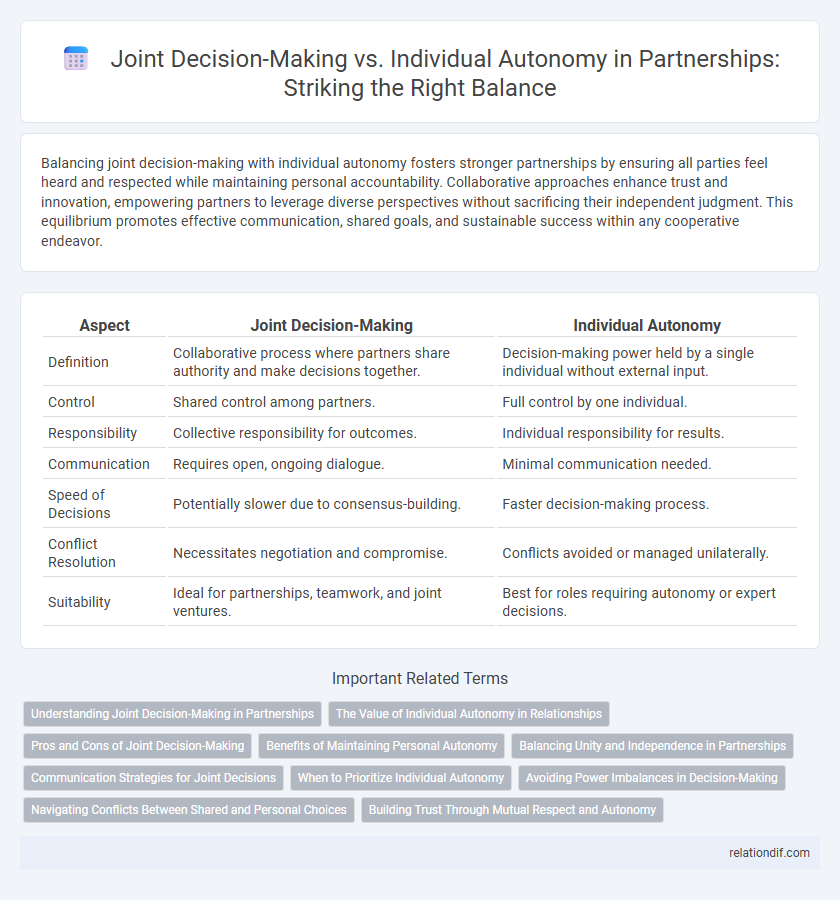Balancing joint decision-making with individual autonomy fosters stronger partnerships by ensuring all parties feel heard and respected while maintaining personal accountability. Collaborative approaches enhance trust and innovation, empowering partners to leverage diverse perspectives without sacrificing their independent judgment. This equilibrium promotes effective communication, shared goals, and sustainable success within any cooperative endeavor.
Table of Comparison
| Aspect | Joint Decision-Making | Individual Autonomy |
|---|---|---|
| Definition | Collaborative process where partners share authority and make decisions together. | Decision-making power held by a single individual without external input. |
| Control | Shared control among partners. | Full control by one individual. |
| Responsibility | Collective responsibility for outcomes. | Individual responsibility for results. |
| Communication | Requires open, ongoing dialogue. | Minimal communication needed. |
| Speed of Decisions | Potentially slower due to consensus-building. | Faster decision-making process. |
| Conflict Resolution | Necessitates negotiation and compromise. | Conflicts avoided or managed unilaterally. |
| Suitability | Ideal for partnerships, teamwork, and joint ventures. | Best for roles requiring autonomy or expert decisions. |
Understanding Joint Decision-Making in Partnerships
Joint decision-making in partnerships involves collaborative evaluation of options, shared responsibility, and mutual agreement to align goals and actions. This process enhances trust, promotes balanced power distribution, and fosters a sense of collective ownership. Effective joint decision-making requires clear communication, respect for diverse perspectives, and commitment to consensus-building.
The Value of Individual Autonomy in Relationships
Individual autonomy in relationships fosters personal growth and authentic self-expression, which strengthens trust and mutual respect between partners. Maintaining independence within joint decision-making processes ensures that each person's values and preferences contribute to balanced outcomes. Prioritizing autonomy enhances relationship satisfaction by preventing resentment and promoting honest communication.
Pros and Cons of Joint Decision-Making
Joint decision-making in partnerships fosters collaboration, leveraging diverse perspectives to enhance problem-solving and creativity, often leading to more informed and balanced outcomes. However, it can also result in slower processes, potential conflicts, and compromises that may dilute individual accountability and swift action. Effective communication and trust are critical to maximizing the benefits while minimizing the drawbacks of joint decision-making.
Benefits of Maintaining Personal Autonomy
Maintaining personal autonomy within a partnership fosters individual creativity and strengthens self-confidence, leading to more innovative and diverse solutions in joint decision-making. It allows partners to bring unique perspectives and expertise to the table, enhancing the quality and effectiveness of collaborative outcomes. Preserving autonomy also reduces dependence and potential conflicts, promoting mutual respect and a balanced power dynamic in the relationship.
Balancing Unity and Independence in Partnerships
Effective partnerships require a strategic balance between joint decision-making and individual autonomy to ensure both unity and independence coexist. Shared decision-making fosters collaboration and strengthens trust, while preserving individual autonomy maintains creativity and accountability within the partnership. Achieving this balance enhances overall productivity and supports sustainable, dynamic partnerships.
Communication Strategies for Joint Decisions
Effective communication strategies for joint decision-making prioritize active listening and transparent information sharing to align partners' perspectives and goals. Utilizing structured dialogue techniques, such as regular check-ins and consensus-building exercises, enhances mutual understanding and minimizes conflicts. Clear, consistent communication ensures that decisions reflect collective input while respecting individual autonomy within the partnership framework.
When to Prioritize Individual Autonomy
Prioritize individual autonomy in partnerships when partners possess distinct expertise vital for specific decisions, enabling faster and more informed outcomes. Situations that require swift responses or involve confidential information benefit from autonomous decision-making to maintain efficiency and discretion. Respecting individual autonomy fosters trust and motivation, balancing collaboration with personal responsibility.
Avoiding Power Imbalances in Decision-Making
Effective partnership hinges on joint decision-making practices that promote equity and prevent power imbalances, ensuring all parties contribute equally to outcomes. Structured dialogue and transparent communication frameworks minimize dominance by any individual, fostering collaborative autonomy rather than unilateral control. Balancing shared authority and respect for individual perspectives enhances trust and sustains long-term, mutually beneficial relationships.
Navigating Conflicts Between Shared and Personal Choices
Balancing joint decision-making with individual autonomy requires clear communication and mutual respect to navigate conflicts effectively between shared goals and personal preferences. Establishing boundaries and prioritizing transparent discussions help partners align interests while preserving personal agency. Implementing conflict resolution strategies like compromise and active listening fosters collaborative solutions without undermining individual choices.
Building Trust Through Mutual Respect and Autonomy
Building trust in partnerships hinges on balancing joint decision-making with respect for individual autonomy, fostering an environment where all parties feel valued and empowered. Emphasizing mutual respect encourages open communication, enabling partners to collaborate effectively while honoring each other's unique perspectives and expertise. This synergy strengthens commitment and promotes sustainable, trust-based relationships crucial for long-term success.
Joint Decision-Making vs Individual Autonomy Infographic

 relationdif.com
relationdif.com